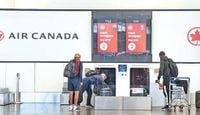What was supposed to be a whirlwind Las Vegas getaway for two sisters from Fort St. John, British Columbia, quickly unraveled into a cautionary tale about the ripple effects of labor unrest in Canada’s airline industry. Kelly Lynn Herriot and her sister’s August trip—planned weeks in advance and centered around a Backstreet Boys concert—became a saga of cancelled flights, missed connections, and mounting expenses, all set against the backdrop of a historic Air Canada flight attendants’ strike.
The trouble began brewing on August 13, 2025, when the Canadian Union of Public Employees (CUPE), representing Air Canada and Air Canada Rouge flight attendants, issued a strike notice following a protracted dispute over wages and, notably, 'ground pay'—the compensation for work performed before and after flights. Herriot, who had booked her tickets nearly a month earlier, had been reassured by news reports that the earliest a strike could begin was August 16. “With our trip on the 15th, we thought we were safe,” she told Energeticcity.ca.
But by August 13, Herriot was receiving warnings from Air Canada about possible disruptions. She recalled, “I spent hours on the phone, first with Air Canada and then with Aeroplan only to be told that if I wanted to cancel, I’d have to pay $150 per passenger.” Since her flights were mostly paid with Aeroplan points, the cancellation fees would have exceeded any refund. Still, she pressed on, deciding to risk the outbound journey while reluctantly booking expensive return tickets with WestJet as a backup.
The first leg, from Fort St. John to Vancouver, went off without a hitch—Air Canada Express flights weren’t affected by the strike. But at Vancouver International Airport, the sisters’ excitement about flying business class evaporated when, just ten minutes before boarding, their connecting flight to Las Vegas was cancelled. “At the gate, agents simply told us we hadn’t been rebooked and to retrieve our bags and go upstairs to speak with another agent,” Herriot recounted. The airport descended into chaos, with lines barely moving and passengers left to fend for themselves. Herriot described the so-called self-serve kiosks as “nothing more than links to the airport’s website.”
With flights to Vegas rapidly selling out, the sisters scrambled and ultimately boarded a Greyhound bus to Seattle. There, they purchased the only available seats—expensive first-class tickets—on a Delta flight departing early August 16. The bus ride, slowed by heavy traffic, added to their fatigue. “Far less time to enjoy the city,” Herriot lamented, “but at least in time for the concert. The Backstreet Boys were incredible and made the stress feel worthwhile, at least for one night.”
Their return journey proved no less fraught. On August 17, after a 30-minute delay on their WestJet flight from Las Vegas to Calgary, the sisters faced a mad dash through customs to catch their connection home. “Onboard, when we asked for help making our connection, the flight attendant told us bluntly to ‘run.’ Meanwhile, dozens of other passengers were also rerouted and stressed.” Despite their best efforts, they arrived at the gate two minutes before closing—only to find their seats had already been given away. “We watched another late passenger board instead,” Herriot said. The sisters were rebooked for a flight on August 18, but without accommodations, as the delay was deemed “controlled.”
Their troubles didn’t end there. Hours at baggage claim yielded no luggage, and it wasn’t until the next day—using an Apple AirTag—that Herriot tracked her bag to an early flight bound for Fort St. John. “We ended up stranded in Calgary for an extra day, paying for hotels and food out of pocket,” she said. “Even at the airport, we saw other families experiencing the same thing, passengers bumped off flights with little explanation or support.” All told, the trip cost Herriot more than double what she had budgeted, and left her exhausted. “Both airlines failed us, and both showed terrible communication and customer service. What should have been a short, fun getaway turned into a logistical nightmare.”
Herriot’s ordeal was far from unique. Across Canada, travelers scrambled as the Air Canada strike—sparked by disputes over compensation—disrupted countless plans. The strike began on August 16, forcing the federal government to intervene that very morning. Invoking Section 107 of the Canada Labour Code, Ottawa ordered both Air Canada and CUPE into binding arbitration. The Canada Industrial Relations Board demanded that flight attendants return to work by Sunday, but union officials defied the order, prompting the board to declare the strike unlawful on August 18. Despite this, the union pressed ahead until a tentative deal was reached, ending the strike on August 19. A ratification vote on the new collective agreement is now underway.
So what, exactly, did the striking flight attendants win? According to Open Jaw and the Canadian Press, the new agreement includes—for the first time—compensation for ground duties. Historically, flight attendants were only paid once the plane’s doors closed and the aircraft pushed back from the gate, leaving pre- and post-flight tasks uncompensated. Wesley Lesosky, flight attendant and president of the CUPE airline division, explained at a news conference last year that, on average, flight attendants were not paid for 35 hours of work per month.
The new deal grants ground pay of 60 minutes for narrowbody aircraft and 70 minutes for widebody jets at 50% pay, rising to 70% by the fourth year of the contract. While still short of the 100% ground pay flight attendants had sought, industry analyst Rob Kokonis told Open Jaw, “Most North American carriers pay ground time between 30 and 60 minutes at 50%. Porter pays 60 minutes at 50%. From a North American perspective, then, Air Canada appears to have a leading formula.”
The implications of this deal stretch beyond Air Canada. Labour experts, such as York University’s Steven Tufts, argue that the precedent is likely to influence negotiations at other Canadian airlines. Air Transat flight attendants tried and failed to secure ground pay in previous talks, but with Air Canada setting the pattern, Tufts told CTV News, “It’s going to go to Air Transat and it’s going to go to WestJet and every other smaller carrier that hasn’t got it.” WestJet’s flight attendant contract expires at the end of this year, and many expect the new Air Canada settlement to serve as a benchmark.
Meanwhile, south of the border, such strikes remain rare. The Associated Press reports that the US Railway Labor Act, which governs airline labor relations, makes it much harder for unionized airline workers to strike. Federal mediators must declare an impasse before any strike can proceed, and even then, the president or Congress can intervene. As a result, airline strikes in the United States are exceedingly uncommon—the last major one, by Spirit Airlines pilots, occurred over a decade ago.
For Herriot and her sister, the resolution of the strike came too late to salvage their vacation. But for flight attendants across Canada, the settlement marks a significant step forward in the fight for fair compensation. As Canadian airlines brace for a wave of new labor negotiations, travelers and airline workers alike are watching closely—hoping that the lessons of this summer will lead to smoother skies ahead.






